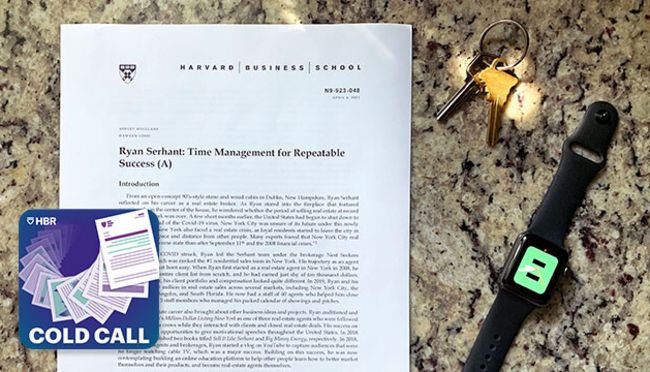Decision Choices and Conditions →
→

- 07 Nov 2023
- Research & Ideas
When Glasses Land the Gig: Employers Still Choose Workers Who 'Look the Part'
Is an eyeglass-wearer more likely to be a strong web developer? Employers that use online talent platforms tend to consider profile photos in final hiring decisions, says research by Isamar Troncoso. What's the role of recruiting platforms in preventing bias?

- 15 Aug 2023
- Cold Call Podcast
Ryan Serhant: How to Manage Your Time for Happiness
Real estate entrepreneur, television star, husband, and father Ryan Serhant is incredibly busy and successful. He starts his days at 4:00 am and often doesn’t end them until 11:00 pm. But, it wasn’t always like that. In 2020, just a few months after the US began to shut down in order to prevent the spread of the Covid-19 virus, Serhant had time to reflect on his career as a real estate broker in New York City, wondering if the period of selling real estate at record highs was over. He considered whether he should stay at his current real estate brokerage or launch his own brokerage during a pandemic? Each option had very different implications for his time and flexibility. Professor Ashley Whillans and her co-author Hawken Lord (MBA 2023) discuss Serhant’s time management techniques and consider the lessons we can all learn about making time our most valuable commodity in the case, “Ryan Serhant: Time Management for Repeatable Success.”

- 20 Jun 2023
- Research & Ideas
Looking to Leave a Mark? Memorable Leaders Don't Just Spout Statistics, They Tell Stories
That killer fever chart in your slide deck might not be as impressive as you think. In fact, your audience might soon forget that critical data point. If you want them to remember your message, research by Thomas Graeber suggests that nothing sticks to the mind like a good story.

- 27 Apr 2022
- Book
Empower Your Employees to Make Better Decisions
The impact of wise decisions can ripple out in an organization. In the book Decision Leadership, Max Bazerman and Don Moore explore how the choices of influential leaders, such as athlete Colin Kaepernick and Humu's Jessica Wisdom, motivate others to do better.

- 12 Apr 2022
- Research & Ideas
Swiping Right: How Data Helped This Online Dating Site Make More Matches
Machine learning might have the answer to an age-old dating conundrum: Who makes the first move? Research by Edward McFowland probes how data can spur more digital interactions, with potentially wide-reaching implications. Open for comment; 0 Comments.

- 17 Dec 2020
- Working Paper Summaries
How Do CEOs Make Strategy?
A study of 262 Harvard Business School-educated CEOs traces differences in strategic decision-making across managers. CEOs leading larger, faster-growing firms tend to make highly structured strategic decisions and use more analytical deliberation. Management education has long-lasting effects on decision-making.

- 06 Dec 2020
- Working Paper Summaries
'Repayment-by-Purchase' Helps Consumers to Reduce Credit Card Debt
Many consumers fail to pay off credit card debt each month and suffer financial consequences. Repayment-by-purchase, allocating payment toward specific purchases on a credit card bill, helps consumers gain a sense of progress and control over credit card debt.

- 17 Aug 2020
- Research & Ideas
What the Stockdale Paradox Tells Us About Crisis Leadership
The Stockdale Paradox and survival psychology contain wisdom for how leaders can manage the coronavirus crisis, according to Boris Groysberg and Robin Abrahams. Open for comment; 0 Comments.

- 09 Jul 2020
- Research & Ideas
It’s Time to Reset Decision-Making in Your Organization
Clear decision-making in a crisis depends on sound methodology and gathering information from a variety of sources. Advice from Boris Groysberg and Sarah Abbott. Open for comment; 0 Comments.

- 13 Apr 2020
- Working Paper Summaries
The Bulletproof Glass Effect: When Privacy Notices Backfire
Consumers regularly encounter privacy notices explaining if and how their personal information will be collected, stored, used, and shared. Evidence in this study demonstrates that privacy notices, though designed to promote a sense of confidence that personal data will not be misused, can undermine consumer trust and decrease purchase intent.

- 12 Dec 2019
- Research & Ideas
How to Turn Down the Boil on Group Conflict
Intergroup conflict can grind office productivity to a halt. Jeffrey Lees discusses how understanding psychological stereotypes can help divided parties compromise. Open for comment; 0 Comments.

- 24 Jul 2019
- Lessons from the Classroom
Can These Business Students Motivate Londoners to Do the Right Thing?
In the Harvard Business School course Behavioral Insights, students work in the UK with psychology experts to understand what motivates consumers and workers. What they learn can help businesses of all types, says Michael Luca. Open for comment; 0 Comments.

- 03 Jun 2019
- Working Paper Summaries
Memory and Representativeness
We explore the foundations of individuals’ probabilistic judgments, looking to better understand the sources of systematic errors. We conduct a laboratory experiment where participants view abstract images and are then asked to recall what they saw. We find evidence that interference in episodic memory contributes to biased probabilistic judgments.

- 02 May 2019
- Sharpening Your Skills
How To Ask Better Questions
To make the best decisions, managers must ask the right questions. This collection of past studies by Harvard Business School researchers will help you gather the critical information needed to prepare for action. Open for comment; 0 Comments.

- 27 Feb 2019
- Working Paper Summaries
Judgment Aggregation in Creative Production: Evidence from the Movie Industry
Selecting early-stage ideas in creative industries is challenging because consumer taste is hard to predict and the quantity to sift through is large. Using The Black List that ranks scripts annually based on nominations from film executives, this study shows that aggregating expert opinions helps reduce quality uncertainty and can influence high-budget production.

- 27 Feb 2019
- Research & Ideas
The Hidden Cost of a Product Recall
Product failures create managerial challenges for companies but market opportunities for competitors, says Ariel Dora Stern. The stakes have only grown higher. Open for comment; 0 Comments.

- 12 Nov 2018
- Research & Ideas
'Always On' Isn't Always Best for Team Decision-Making
Is it possible for teams to communicate too frequently? Research by Ethan Bernstein and colleagues suggests that groups that meet less often may be better at problem-solving. Open for comment; 0 Comments.

- 19 Sep 2018
- Sharpening Your Skills
Say Again? Uncommon Advice for Common Business Problems
Sometimes the right answer is far from obvious. Learn why an introvert may be the best choice to lead your team, taking a pay cut might make you a better manager, and why you should not trust your gut when the pressure is on. Open for comment; 0 Comments.

- 09 Feb 2018
- Working Paper Summaries
Developing Novel Drugs
This paper contributes to our understanding of how financing constraints affect the direction of innovation in drug development. The authors develop a new measure of drug novelty based on molecular characteristics, and explore the tradeoffs involved in decisions to develop more novel therapies. Open for comment; 0 Comments.

Want to Make Diversity Stick? Break the Cycle of Sameness
Whether on judicial benches or in corporate boardrooms, white men are more likely to step into roles that other white men vacate, says research by Edward Chang. But when people from historically marginalized groups land those positions, workforce diversification tends to last. Chang offers three pieces of advice for leaders striving for diversity.